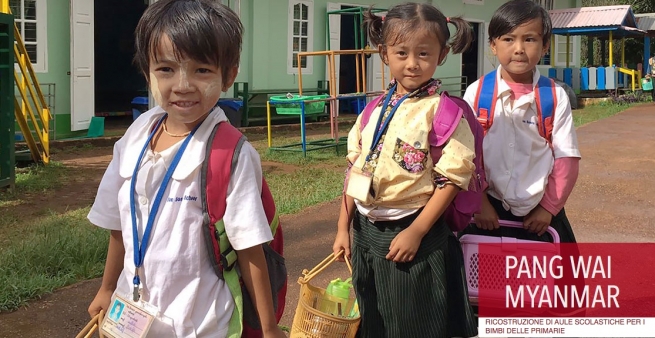MYANMAR: Salesian missionaries launch project to build schools in isolated tribal areas

(MissionNewswire) Salesian missionaries in Pang Wai, a territory in northeastern Myanmar inhabited by isolated tribes, are planning to develop a network of small primary schools to ensure that youth in the region have access to education. The area is on the border of China and is a region of extremely dangerous rebels. It is a mountainous area, characterized by precious stones mines, especially rubies. Hunting is the main source of basic food but also the reason for repeated conflicts between one village and the next.
Facilitating a large educational project is not the easiest of tasks in Pang Wai, but Salesian missionaries are committed to opening schools in four villages. First, they plan to restore and reuse a number of old school buildings, which have been long neglected and are now used as a place where animals seek shelter. After more than five years of neglect, many roofs have collapsed or are crumbling. The walls are dirty and fallen in. The Salesian Mission office in Turin is helping to support this effort.
Salesian missionaries want to focus on the education of the youngest children, teaching them a foundational education along with the basic principles of respect for human dignity and social life. The school will educate local children 12 years and younger. Educators will begin to teach them to read and write with activities and group games. The tribal chiefs have agreed to this educational project, which is a guarantee of security and community involvement.
Salesian missionaries have also been asked by the local bishop work with local populations in the hopes to decrease clashes and bring a more peaceful way of life to the communities. This work is challenging. The country’s authorities periodically carry out “land reclamation” campaigns that consist of ethnic cleansing, which kills many in the local regions. This is often done to support the dominant interest of foreign mining companies, especially those that are located immediately beyond the border. They continue to take the country’s natural resources without restrictions.
While Myanmar as a whole is enjoying some overall economic growth, not all people in the country are enjoying the benefits of this expansion. Many are still living in poverty. Salesian missionaries operate 10 centers throughout Myanmar to help those who are poor, in need of education and are marginalized.
“The work of Salesian missionaries in Myanmar and in programs around the globe goes beyond education,” says Father Mark Hyde, director of Salesian Missions, the U.S. development arm of the Salesians of Don Bosco. “Missionaries aim to serve the whole person by making sure that basic needs like health and nutrition are met in addition to other social service needs.”
While Myanmar is the second largest country in Southeast Asia and rich in natural resources, it is one of the least developed countries in the world, ranking 148 out of 188 countries according to the 2015 Human Development Report. More than a quarter of Myanmar’s population still lives in poverty with the poverty rate rising sharply to 70 percent for those living in rural areas. Myanmar also has the lowest life expectancy and the second highest rate of infant and child mortality in the region. Just one-third of the population has access to the electricity grid, and only about half of school age children complete their primary education.
###
Sources:
ANS – Myanmar – Reborn, the primary school, among headhunters
World Bank – Myanmar




